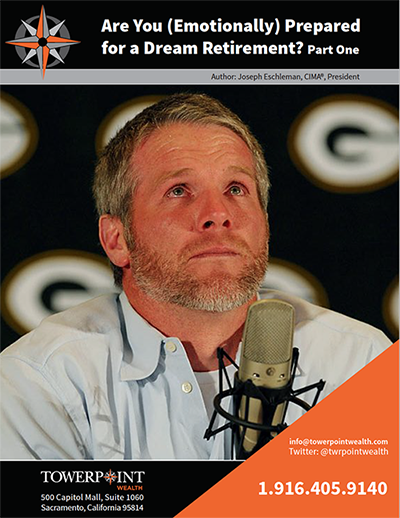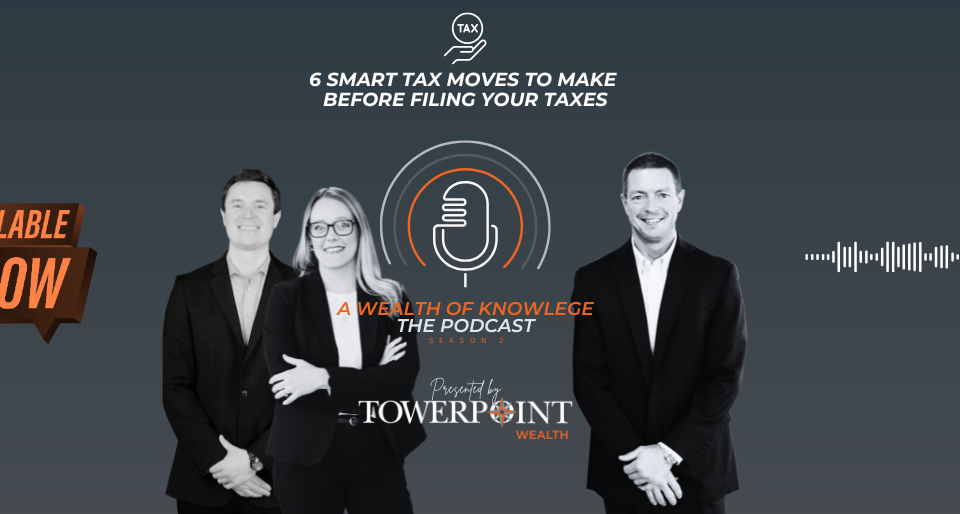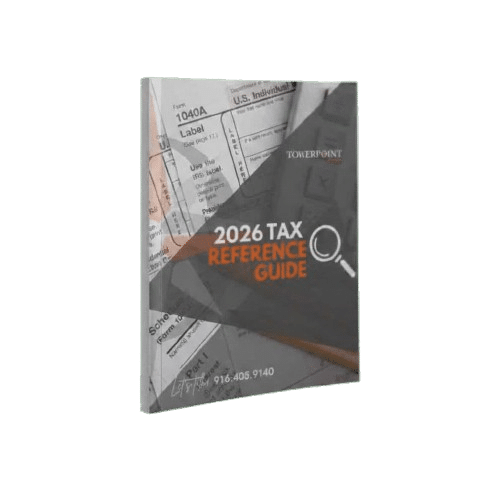Most of us don’t give significant thought as to how our life and self-identity will really change once we retire. While we know how important financial planning for retirement is, many of us don’t realize that there are more retirement concerns than just numbers.
In our last post, we asked you to consider how you would answer a few basic but important questions before you retire, in order to better help your psychological adjustment to the change that’s coming: How do you want to live, where do you want to live, are you and your spouse on the same page about retirement, and what lifestyle will your health afford you?
Another factor that can affect our emotional preparedness for the independence of retirement is how tightly our self-identification is tied in with our job title. If you have been a math teacher, or an oncologist, or a mortgage broker for decades, how will you introduce yourself at a party after retirement? And what will you do all day?
Eric Eschleman, Joe's dad, is the CFO of a large brick manufacturer, and has been working for the same company for over 38 years. Though he and his financial advisor have confirmed that, at age 65, he has reached all of the traditional economic markers for retirement, he anticipates it as joyously as he would anticipate, in his words, “jumping off a 50-foot cliff.”
Eschleman says he’s considered retirement once or twice, but adds, “I’m usually in the office by 6 a.m. – [After retirement] what am I going to do when I get up in the morning?” Taking the step off the plateau of familiarity can be difficult.
Self-identity in retirement may be different

Because we often intermingle our identity with our career, we can be dealt quite a shock in determining “who we are” once we retire.
To properly prepare for retirement, it’s important to recognize that it is a major life transition that may impact you on an emotional level.
Your self-image is important, and many people identify strongly with their career and the relationships they have kept with it. These identifications can rapidly fall away when you retire, which can be daunting and depressing. Conversely, and perhaps more importantly, this frees up room for new growth in your personal development.
According to retired counseling psychology professor Nancy Schlossberg, there are different ways to approach retirement and finding one’s new identity. These approaches include:
-
- Being a continuer: Continuers take something they did as a career and adjust it as they continue on through retirement. For example, a journalist might become an author or start a blog. In these roles, we maintain some form of our work-related identity - just manifested in a different way.
-
- Being a searcher:This is someone who investigates different activities, interests, and hobbies once they are retired, similar to how a high school graduate may explore different interests before settling on a college major. Searchers may seek out a variety of volunteer opportunities, take on new projects or hobbies.
-
- Becoming an adventurer:People who fall into this category upon retirement typically seek out an entirely new adventure. For instance, an architect may become an artist, or a dentist may become a baker. This type of person considers retirement as a way to make an exciting change in life, and pursue interests they previously had no time to explore or cultivate.
- Becoming an easy glider or retreater: Two additional post-retirement identities include easy gliders, people who don’t have a set schedule and may do something different each day, or retreaters, those who stay at home until they decide what path they want to take next.
 Towerpoint Wealth client and Rancho Murieta resident Bridget Gransee worked as a regional trainer and director of associate development when she retired at 65. She was a valued employee, professionally recognized, and comfortable in her role at a national department store. Now, post retirement, Bridget is an easy glider: She’s “letting the first year go by,” golfing two to three times a week, reconnecting with people, reading books, and seeing films. “I have no sense of a loss of identity,” she says.
Towerpoint Wealth client and Rancho Murieta resident Bridget Gransee worked as a regional trainer and director of associate development when she retired at 65. She was a valued employee, professionally recognized, and comfortable in her role at a national department store. Now, post retirement, Bridget is an easy glider: She’s “letting the first year go by,” golfing two to three times a week, reconnecting with people, reading books, and seeing films. “I have no sense of a loss of identity,” she says.
Larry Britts led an 80-person team at the company where he was employed for 42 years and played tennis and pickleball in his free time. Since his retirement, time on the court has moved front and center, as have extended visits with his four-year-old granddaughter with whom he is “forming a close bond.” He and his wife took a trip to Europe this summer and "knocked an item off his bucket list” – seeing Wimbledon. They have already signed up for a “bike and barge” tour next year that will end in Paris. He enjoys that his “health allows him to get actively involved and take time to really get to know and learn about people [he meets].” In Schlossberg’s terms, Larry approaches retirement as a searcher.
Ann Martin turned 65 and took six months to fully retire from a sales career. A true adventurer, she had been preparing for her lifestyle change for several years — paring down her possessions, and purchasing a fifth-wheel trailer and truck to pull it. She started with a brief “vacation” at a riverside campground in Coloma, then began exploring opportunities with the State Parks, integrating her lifelong hobby (birdwatching) into a post-retirement avocation.
Eric would like to be, in Schlossberg’s terms, a continuer. He sees the optimal situation as having a post-retirement job that is “special-project driven.” One where he could “keep busy, but on a not-so-regular basis.” And when he’s not working on a project, he could spend more time traveling—to Europe, to the Caribbean, and of course, out to California to visit his family.
Purpose and self-identity pivots in retirement are healthy
Having an emotionally healthy retirement means acknowledging that you are literally turning the page to a big new chapter of your life, transitioning into a new lifestyle that includes new friends, experiences, and most likely, a new identity.
Don’t forget to be flexible, realistic, and patient with yourself when setting retirement goals and determining your new lifestyle. You will be hungry to figure it all out as quickly as possible, but will be happier if you realize you can’t control everything, and that sometimes you just need to relax and have faith that things will work out. Let go and let life happen. Or, as the poet Rumi said: “Try not to resist the changes that come your way. Instead let life live through you. And do not worry that your life is turning upside down. How do you know that the side you are used to is better than the one to come?”
When you look out into that next season of your life, what do you see?
We are here to help.
Of course, when thinking about retirement, we cannot forget the financial aspect. As a fully-independent wealth management firm, Towerpoint Wealth is here to help you gain financial confidence and reach your retirement goals as you take on this important life transition. If you’re interested in learning more about how we can help you plan your retirement, please call (916-405-9140) or email us (info@towerpointwealth.com) for a complementary consultation.
Download "Are You (Emotionally) Prepared for a Dream Retirement? Part 2"
Disclosures: Towerpoint Wealth is a Registered Investment Advisor. This platform is solely for informational purposes. Advisory services are only offered to clients or prospective clients where Towerpoint Wealth and its representatives are properly licensed or exempt from licensure.
Past performance is no guarantee of future returns. Investing involves risk and possible loss of principal capital. No advice may be rendered by Towerpoint Wealth unless a client service agreement is in place. No portion of any content within this commentary is to be interpreted as a testimonial or endorsement of Towerpoint Wealth investment advisory services and it is not known whether any clients referenced herein approve of Towerpoint Wealth or its services; nor should it be assumed that any references to our clients are representative of all our clients’ experiences.







